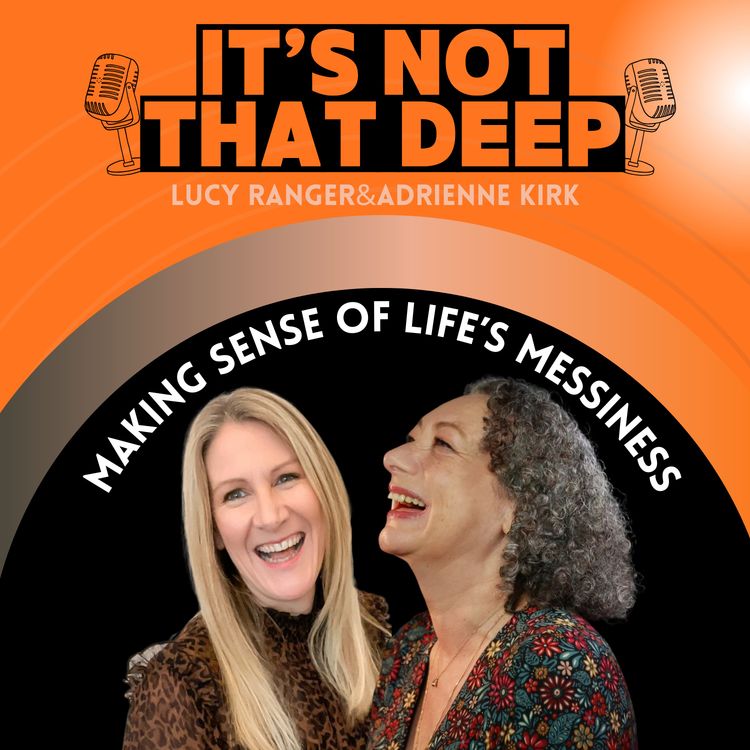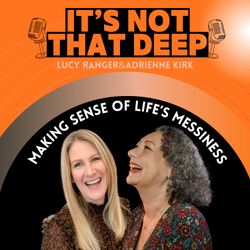Share

It's Not That Deep
Why do we find it hard to forgive ourselves?
In this episode we discuss how difficult it can be to let go of something we regret like and forgive ourselves for it. We often set ourselves standards that are impossible to live up to; and that we have a tendency to dwell on mistakes, which leads to a sense of guilt and shame.
It is also hard and extremely uncomfortable to process our mistakes; to make sense of them and find the learning. So we lean into self-blame and criticism instead which might stem from the brain trying to find a solution.
The more helpful way, though, is to find the learning, to see mistakes as a chance for change and growth. And to do that, we need to be able to look at the situation and in a kindly way explore what happened and why. How would we respond if a friend had made a mistake, most likely not in the way we generally treat ourselves!
Lucy and Adrienne can be contacted through their websites:
www.presenceofmind.life (Lucy)
www.adriennekirk.uk (Adrienne)
More episodes
View all episodes

91. Why do we find it easier to help others rather than ourselves?
29:26||Season 1, Ep. 91In this episode we explored why it seems so much easier to find a solution to other peoples problems that it is our own. We discuss the importance of self-compassion and mindfulness and getting a bigger picture perspective, particularly in challenging situations. We reflected on the tendency we have to hold ourselves to a much higher standard than we do for others, that we are less likely to show ourselves understanding and compassion.We emphasised the need to reflect on the advice we would give to others, particularly those we love, and apply it to ourselves. We talked about giving ourselves a moment of stillness and presence rather than seeking immediate solutions. Trust that self-support and solutions will emerge from a soothed system, rather than the hard time we give ourselves when we are in fight or flight mode!TakeawaysCan we think about what advice would we give to others we care about?Can we apply that advice to ourselves.In difficult times, we often need compassion, not solutions.Taking a moment to breathe can be beneficial.Mindfulness helps us to just be in the moment.It's important to reflect on our feelings.We often bombard ourselves with solutions when we need support.Self-compassion is crucial during tough times.Being present can help alleviate stress.We should treat ourselves with the same kindness we offer others.Adrienne and Lucy can be contacted through their websites:www.presenceofmind.life (Lucy)www.adriennekirk.uk (Adrienne)
90. Why do we view some emotions as negative?
30:47||Season 1, Ep. 90In this episode we explore why we view some emotions as negative. It is natural to categorise our feelings as good or bad; wrong or right. The negative ones we experience feel unpleasant and so we have a tendency to push them away.We consider the importance of facing these emotions and starting to see them as unpleasant rather than bad or negative. All our feelings are data or information about our current state, so it can be helpful to develop a curiosity about them and what they are telling us about ourselves. We emphasise the need to manage difficult emotions rather than suppressing them, highlighting the impact of avoidance on mental health.Takeaways:When faced with unpleasant emotions, we often seek distractions.Substance abuse and busyness can be unhealthy coping mechanisms.Avoiding difficult emotions can lead to negative consequences.It's important to face and manage our emotions directly.Suppressing feelings can result in them resurfacing later.Healthy emotional management is crucial for mental well-being.Understanding our emotional responses can lead to better coping strategies.Emotional tolerance is a skill that can be developed.Facing emotions can lead to personal growth and resilience.Support systems can aid in managing difficult feelings.Adrienne and Lucy can be contacted through their websites:www.presenceofmind.life (Lucy)www.adriennekirk.uk (Adrienne)
89. Why do we replay the past?
31:33||Season 1, Ep. 89In this episode, we explore the reasons behind why individuals replay past events and the patterns of behaviour that emerge from these experiences. We discuss the impact of fixed identities, sedimented beliefs, the weight of regret and shame, and the importance of self-compassion in navigating these feelings. The conversation emphasises the need for understanding our decision-making processes and the illusion of right choices, while also highlighting the significance of seeking help and support when feeling overwhelmed. We hope that this discussion provides insights into breaking the cycle of overthinking and fostering personal growth.TakeawaysWe often replay the past due to ingrained patterns of behaviour.Fixed identities can limit our perception of choices.Shame and regret can lead to self-torture in our thoughts.Decisions made in the past were based on available evidence at the time.Self-compassion is crucial for personal growth and healing.Thoughts are not facts; they can be observed and challenged.Seeking help is not a weakness but a necessary step for recovery.We take our existing patterns with us into new situations.It's important to learn from the past without harsh judgment.Acceptance of where we are now is the first step to change.Adrienne and Lucy can be contacted through their websites:www.presenceofmind.life (Lucy)www.adriennekirk.uk (Adrienne)
88. Why don't we invest in friendships as much as we could?
32:40||Season 1, Ep. 88In this episode, we explore the importance of investing in friendships, the challenges of nurturing them as life changes, and the vital role of communication and vulnerability in maintaining connections. It can be easy to let connections slide as life gets busy, however we often regret the loss of friendships when this happens.We emphasise the need for balance between self-care and social engagement, highlighting how meaningful relationships contribute to our overall well-being and sense of purpose. If we don’t value ourselves we can feel that others won’t mind, or even notice, if we don’t see them. And this can mean that relationships slide away without us necessarily meaning to let them do so.It takes work to keep up with friendships especially as we get older, however the benefits are so valuable for us. Sometimes self-care means pushing ourselves to do something that feels effortful but will be meaningful for us.TakeawaysFriendships often take a backseat as life gets busier.Long-term friendships require ongoing nurturing to thrive.Life changes can impact the time and energy we invest in friendships.Communication is key to maintaining connections, especially during tough times.Self-worth can affect how we engage in friendships.Balancing self-care with social connections is crucial.Creating meaning in life often comes from our relationships with others.Community support is essential for mental well-being.Modern connections may differ but are still valuable.Acts of kindness can create a virtuous cycle of connection.Adrienne and Lucy can be contacted through their websites:www.presenceofmind.life (Lucy)www.adriennekirk.uk (Adrienne)
87. Why do we feel guilty for stopping?
30:20||Season 1, Ep. 87In this episode, we explore the guilt we feel when taking breaks, and the cultural obsession with busyness. We discuss how modern technology and societal expectations have blurred the lines between work and personal time, leading to a constant state of doing. We discuss the importance of recognising the need for rest, nourishing activities, and the impact of these on mental health and productivity. We also touch on the privilege of being able to choose when to stop and the necessity of finding balance in life. We note how, even if we are unable to take long breaks it is necessary to stop, even briefly, to breathe and notice this moment.Takeaways:We often feel guilty for taking breaks, which can lead to burnout.Cultural norms have created a badge of honour around busyness.Rest is essential for mental health and productivity.We need to learn how to be present and enjoy non-doing activities.The pressure to be constantly productive is exacerbated by technology.Recognising the need for rest can improve overall effectiveness.It's important to challenge the stories we tell ourselves about work and rest.Taking time for ourselves is not a luxury, but a necessity.Mindfulness can help us reconnect with the present moment.Life is happening now, not in the future when we are less busy.Adrienne and Lucy can be contacted through their websites:www.presenceofmind.life (Lucy)www.adriennekirk.uk (Adrienne)
86. Why don't we ever feel ready?
29:31||Season 1, Ep. 86In this episode, we delve into what it really means to feel ‘ready’. We talk about our own experiences of not being ready to act, and what was holding us back. We explore how things like perfectionism, nerves and putting things off can hold us back, and why waiting for the ‘perfect moment’ often just keeps us stuck. Along the way, we touch on relationships, decision-making, and why it helps to explore, and get comfortable with, a bit of uncertainty. Readiness isn’t something you wait for - it’s something you do, with courage and self-awarenesstakeawaysWe can prevent ourselves from doing things because we don't feel ready.Perfectionism can create barriers to taking action.Anxiety can amplify feelings of unpreparedness.The need for everything to be perfect can hinder progress.Procrastination is often linked to fear of failure.There is no such thing as perfect conditions for starting something new.Waiting for the right time can lead to missed opportunities.Tolerating discomfort is essential for growth and action.Clarity in our intentions can help us move forward.Taking action is more important than waiting to feel ready.Adrienne and Lucy can be contacted through their websites:www.presenceofmind.life (Lucy)www.adriennekirk.uk (Adrienne)
85. Why do we feel the need to fix ourselves?
27:11||Season 1, Ep. 85In this episode we discuss that there are two types of ‘fixing’. There’s the wanting to fix ourselves because we believe we are ‘broken’ or ‘damaged’ and the wanting to change the way in which we meet a particular situation in order to manage ourselves in a more helpful manner.If we can move away from the idea that we need to be fixed, and turn more to the idea that other ways of engaging with our world might be more supportive – that a behaviour or attitude might benefit from being fixed – then we just might find more peace in our life.Adrienne and Lucy can be contacted through their websites:www.presenceofmind.life (Lucy)www.adriennekirk.uk (Adrienne)
84. Why do we feel responsible for other people's feelings?
33:41||Season 1, Ep. 84In this episode we discuss feeling responsible for other people's feelings. Often that means that we can find it hard to stick to our boundaries because we don’t want to upset other people. This can then lead us to feeling that our needs don’t count and we can become frustrated, sad or even angry.Of course we don’t like to upset others, however we are all responsible for how we respond to situations. It is possible to take accountability for our own actions, but not how others respond to those actions. And this is important though difficult to remember this when we are faced with the distress of others.Generally it’s not an either/or choice, it is possible to take care of our own feelings and the feelings of others.Adrienne and Lucy can be contacted through their websites:www.presenceofmind.life (Lucy)www.adriennekirk.uk (Adrienne)
83. Why do we feel the need for labels?
30:25||Season 1, Ep. 83In this episode we discuss the pros and cons of having labels. They can help us to understand ourselves, and to find people who are like us. They can also separate us from others, lead us to judge and be judged for our opinions.This episode became something we weren’t expecting! We ended up debating the consequences of aligning ourselves too closely to our opinions, the labels we use to describe ourselves and the dangers of not allowing ourselves to have a genuine curiosity about the reasons we, and others identify with the labels they pick for themselves.Adrienne and Lucy can be contacted through their websites:www.presenceofmind.life (Lucy)www.adriennekirk.uk (Adrienne)